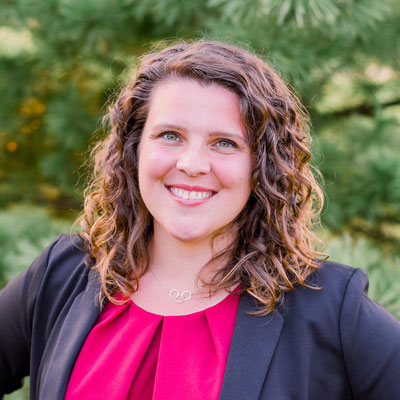“In my classes, students think about history, economics, politics, and culture so we can question and critique the systems and structures that shape our media and world.”
Dr. Guldin earned her PhD in Communication and Media Studies from the School of Journalism and Communication at the University of Oregon. Her research interests include critical media literacy education and popular culture. She uses a critical cultural approach to understand media phenomena through the theoretical frameworks of critical political economy of media and Critical Race Theory. Her most recent works address news literacy, ecomedia literacy, and journalistic learning.
Dr. Guldin’s teaching experience is well-rounded and diverse. She has taught a range of classes, from Introductory Rhetoric to Fact or Fiction. In additional, she has taught elementary schoolers, middle schoolers, undergraduates, and graduate students. In her courses, Dr. Guldin applies approaches and practices of critical pedagogy to support student-centered learning and personal growth.
Outside of work, Dr. Guldin loves watching good movies and trash TV (and some good TV, too), baking, getting outdoors, walking while listening to audiobooks, and exploring local festivals and events.
Learning & Teaching
- COMM 115 - Children and Media
- COMM 215 - Ecomedia Literacy
Works
- Guldin, R., Noga-Styron, K., & Britto, S. (2021). Media consumption and news literacy habits during the COVID-19 pandemic. The International Journal of Critical Media Literacy, 3(1), 43-71. https://doi.org/10.1163/25900110-03030003
- Guldin, R. (2021). [Review of the book Elementary schoolers, meet media literacy: How teachers can bring economics, media, and marketing to life, by J. Wasserman & D. W. Loveland]. Journal of Media Literacy Education, 14(1), 183-185. https://doi.org/10.23860/JMLE-2022-14-1-13
- Guldin, R. (2021). [Review of the book United States of distraction: Media manipulation in post-truth America (and what we can do about it), by N. Higdon & M. Huff]. Democratic Communiqué, 30(1), 1-4. https://doi.org/10.7275/5pm7-z291
- Guldin, R., Madison, E., & Anderson, R. (2021). Writing for social justice: Journalistic strategies for catalyzing agentic engagement among Latinx middle school students. Journal of Media Literacy Education, 13(2), 71-85. https://doi.org/10.23860/JMLE-2021-13-2-6
- Guldin, R. (2021). Receiving and resisting: Toward a market-driven cultural hybridity. International Journal of Cultural Studies, 24(6), 936-952. https://doi.org/10.1177/13678779211009911
- Guldin, R. (2021). Of Gloops and Goldbergs: An analysis of fat boys and class in United States children’s films with ensemble casts. The Journal of Popular Culture, 54(1), 47-66. https://doi.org/10.1111/jpcu.12991
- Guldin, R., Applequist, J., & Bell, T. (2020). ‘Disney is ruining my kid!’: A case for cultivation and social learning in tween TV by examining depictions of social aggression in 2000s Disney Channel programming. In C. Bell (Ed.), Disney Channel Tween Programming: Essays on Shows from Lizzie McGuire to Andi Mack. McFarland & Company, Inc.
- Smith, H., Menezes, S., Canfield, K., Guldin, R., Morgoch, M., & McDuffie, K. (2020). Moving toward inclusion: Participant responses to the Inclusive SciComm Symposium. Frontiers in Communication, 4(77), 1-9. https://doi.org/10.3389/fcomm.2019.00077
- Bybee, C., & Guldin, R. (accepted, forthcoming). Reclaiming media education for the environment: A case for critical ecomedia literacy in professional journalism schools. In S. Gennaro, N. Higdon, & M. Hoechsmann (Eds.), Critical media literacy in higher education: Transformative practice and radical democracy in higher education. Routledge.
- Guldin, R., & Harris, B. (accepted, forthcoming). ‘Who wouldn’t want to summon dragons and trolls?’: Constructing communities at Friday Night Magic. In S. Jones (Ed.), Essays on Magic: The Gathering. McFarland & Company, Inc.
- Madison, E., Anderson, R., & Guldin, R. (accepted, forthcoming). The Journalistic Learning Initiative. In J. Anderson & K. Czarnecki (Eds.), Power lines: Connecting with urban teens through media literacy in libraries. American Library Association.
- Madison, E., Guldin, R., & Anderson. R. (accepted, forthcoming). Cultivating agency and advocacy through journalistic learning. In M. Yough & L. H. Anderman (Eds.), Teaching to prepare advocates. Information Age Publishing.
Service
- Union for Democratic Communications (Steering committee member)
- Critical Media Literacy Conference of the Americas (Steering committee member)
- American Educational Research Association
- International Association for Media and Communication Research
- National Association for Media Literacy Education
- Popular Culture Association
- Society for Cinema and Media Studies
- Kappa Tau Alpha Honor Society
- Omicron Delta Kappa Honor Society
- Phi Eta Sigma Honor Society
- Phi Kappa Phi Honor Society
Other
- Outstanding Dissertation 2022, SOJC University of Oregon
- Dissertation Research Fellowship 2020, Graduate School University of Oregon
- Lokey Scholarship 2020, SOJC University of Oregon
- Columbia Scholarship 2016-2019, SOJC University of Oregon
